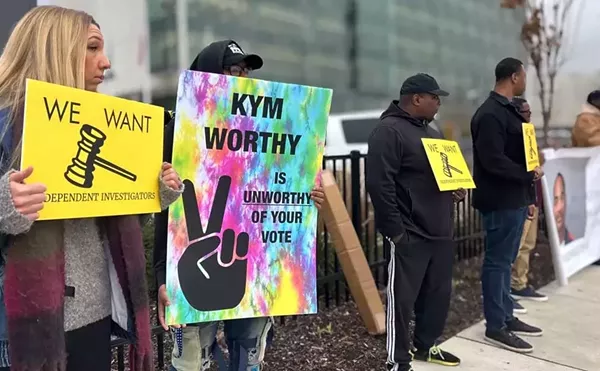
Audio By Carbonatix
[
{
"name": "GPT - Leaderboard - Inline - Content",
"component": "35519556",
"insertPoint": "5th",
"startingPoint": "3",
"requiredCountToDisplay": "3",
"maxInsertions": 100,
"adList": [
{
"adPreset": "LeaderboardInline"
}
]
}
]
After all the politicking and polls, we're near the time when lip flapping will turn into actual votes, beginning with the Iowa caucus Jan. 3. And with African-American Sen. Barack Obama in the mix it's going to be interesting to see who garners the lion's share of black votes. Sen. Hillary Clinton has traditionally had a strong constituency among black voters. And she has received endorsements from African-American organizations and leaders. Last week a group of black ministers in South Carolina endorsed her. The Congressional Black Caucus members have split their endorsements 15-12 in Clinton's favor over Obama.
Obama, although not running a traditional African-American style campaign, is getting his share of African-American endorsements, from the 12 members of the black caucus to civil rights leader Rev. Joseph Lowery and television host Oprah Winfrey, who is campaigning for Obama in Iowa, South Carolina and New Hampshire. Obama's black supporters tend to be younger, up-and-coming types.
How both Obama and Clinton do among black voters early on — especially in South Carolina — could be key to their long-term success. However, according to the Rev. Jesse Jackson, neither candidate is addressing issues important to the black community. Last week Jackson made news when he said that almost all the Democratic candidates are ignoring black voters. He said that the only candidate addressing those issues is the ever-populist John Edwards, whose campaign has centered on poverty and jobs.
But what are the black issues? Can any set of issues be identified as such? A recent National Public Radio-Pew Research Center poll cast light on a fractured black electorate whose identity issues and values are not easily defined.
The NPR-Pew poll found that only 53 percent of blacks, a slim majority, view themselves as a single race; 37 percent said blacks are not a single race and the other 10 percent appeared somewhat confused. The poll also found that 53 percent of black people think that "blacks who can't get ahead are mostly responsible for their own condition," and 61 percent say middle-class and poor blacks are further apart in their values than in the past.
It's not all that clear what the pollsters mean by race. But let's assume that they mean that blacks aren't the monolithic, one-size-fits-all, same-doing, same-thinking group that never really existed but was defined that way by traditional American racism.
There have always been divisions in the black community, socially and politically. Just a superficial glance today reveals a conservative, church-going, mostly working-class branch that increasingly preached Republican values in recent years; a middle-class branch that traditionally supports liberal Democratic politics; a poor group that tends to support liberal policies but doesn't vote much and a scattering of other constituencies such as the hip-hop nation, immigrants, Islamists, socialists, communists, Garveyites, gays and more.
The poll's question of different values is pretty open-ended too. The survey vaguely refers to values as "things people view as important or their general way of thinking." OK ...
The poll found that 67 percent of black men and 74 percent of black women think rap music is a bad influence on black America. That's as close to a united front as I can see in this survey. As to black newsmakers, 87 percent said that Oprah Winfrey is a good influence while only 17 said the same thing about 50 Cent — although Kanye West came in at 49 percent favorable, ahead of Clarence Thomas' 31 percent. Bill Cosby at 85, Bishop T.D. Jakes at 76 and Obama at 76 got the high scores for being a good influence.
It's notable that the majority of blacks who see a values gap are middle class — i.e. those who have made it. But the majority who no longer see blacks as a single race are young (ages 18-29).
So what are the issues that African Americans agree on? The NPR-Pew poll found that good jobs (58 percent), unwed mothers (50 percent), crime (49 percent) and school dropout rates (46 percent) were the biggest problems of concern in the black community.
So Jackson may be right that the candidates aren't addressing the issues important to African-Americans. The candidates are talking about the Iraq war (most blacks want to see it over, the poll said), immigration (most blacks don't care much, the poll said) and health care reform (most blacks should care but the poll didn't mention it).
While Jackson credits Edwards with addressing black issues, the black leader has endorsed Obama's candidacy. So Jackson is maintaining black solidarity even as he criticizes Obama. And Oprah's support, at least on the surface, shows more black solidarity. It doesn't hurt that Obama and Oprah are two blacks with high favorable ratings from white and black people.
One last thing, the NPR-Pew poll found that while blacks' ratings of traditional black political leaders have generally declined over the years, Obama still gets top marks with 89 percent favorability. Although only half of black respondents said he strongly shares black community values and interests, they can still get behind the brother.
The suggestion in the NPR-Pew poll and the electoral dynamics is that as a nation we've moved beyond "can a black man win?" to "how can Obama win?" The same thing goes for Clinton. It's beyond "can a woman win?"
A lot of people are casting their support based on who they think is electable. Indeed, more blacks than whites said that Obama's race will hurt him in the election if he gets the nomination.
Those who dissect politics are hedging their bets on Obama and Clinton based on who they think is electable. Who's electable? The candidate you vote for.
As long as we're looking at numbers here are some that might be of interest. An organization called Diversity Inc. broke down the leading contenders' campaign staffs for racial diversity. Clinton has by far the most racial diversity on her staff with about 20 percent African-American, about 15 percent Latino, and about 25 percent Asian. That leaves about 40 percent white, the only staff where whites are less than 50 percent of the staff. Gov. Bill Richardson has the second most diverse staff with about 56 percent white, about 10 percent black, about 30 percent Latino and about 4 percent Native American. Obama's the third most diverse with about 58 percent white, about 35 percent black and about 7 percent Latino.
Republican diversity on campaign staffs was pitiful. McCain is the most diverse with 92 percent white, 4 percent black and 4 percent Latino. Republican front-runner Rudy Giuliani's campaign seems to be all white, all the time.
Diversity Inc. also broke it down by gender. Gov. Mike Huckabee has the most women on his paid campaign staff with about 49 percent; Clinton is next with about 46 percent; Obama's third with about 40 percent. Alas, Giuliani comes in last again with about 25 percent women, proving himself to be a mostly white guys kind of a guy. Still he's got a few women around. Gotta keep an eye out for that next wife.
Polls may be inexact but these numbers are real. I would guess if you want to know what the candidates' administrations would look like, you should see who they are surrounding themselves with right now.
Larry Gabriel is a writer, musician and former editor of Metro Times. Send comments to letters@metrotimes.com





